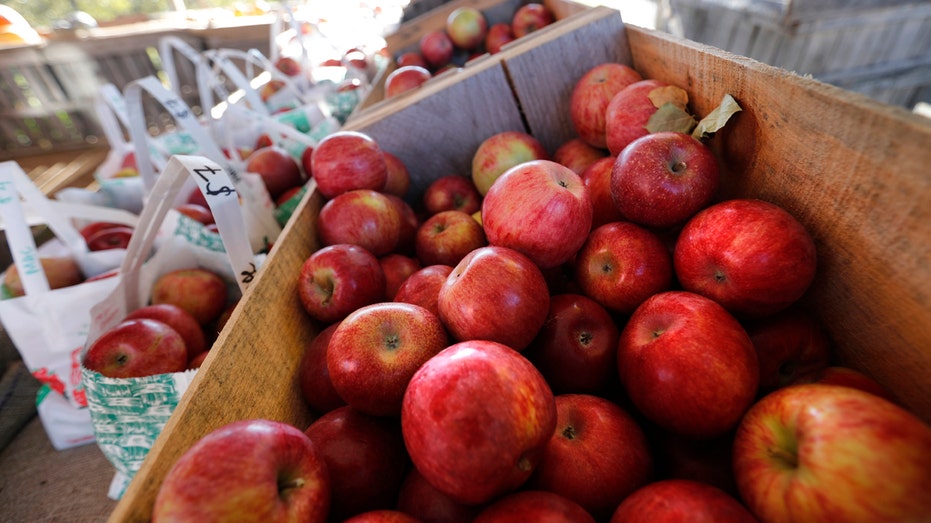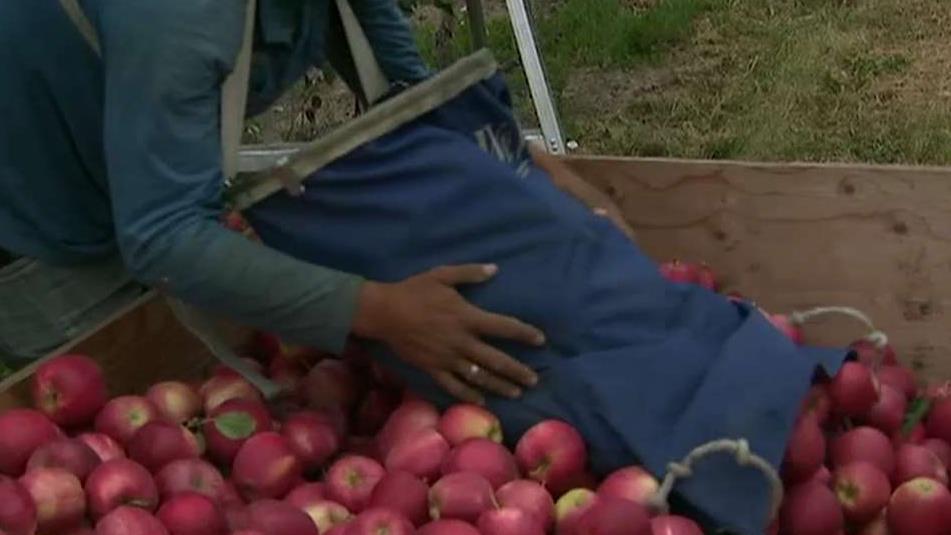Fruit farmers getting squeezed by labor visa fight
The apple harvest in Washington state is in full swing. The labor intensive job is always stressful, but increasingly orchard owners are worried if they can afford to pick all the ripe fruit. Rob Valicoff, owner of Valicoff Fruit Company which grows 1,700 acres of apples, peaches, cherries, apricots and pears, relies almost entirely on temporary foreign guest workers. Of his 220 employees this fall, 200 were brought in from Mexico through the H-2A Visa program.
Valicoff says the program is expensive and inflexible, yet he’s forced to use it because otherwise he would not have enough workers to harvest his fruit.
“It’s kind of scary,” Valicoff says, “because these farms got so large that the payrolls on any given week are huge.”
A record 250,000 H-2A Visa holders are working this year on U.S. farms. The 25,000 of them working in Washington state are making at least $15.03 per hour. That’s $3.03 above the state minimum wage. Additionally farmers had to pay for their visas, provide housing and transport them from their homes to the farm and then back home when the season is over. Valicoff figures his cost is $1,500 per H-2A worker before he’s picked a single apple.
“At some point enough has to be enough,” Valicoff says, “We may have to produce less, because it requires so much labor.”

In this Oct. 26, 2018, photo, apples are displayed for sale at the Apple Acres orchard, in Hiram, Maine. New England apples are typically sold fresh and locally. The region's apples producers are likely to end the year slightly behind their average p (AP)
The Trump Administration apparently agrees. The Department of Labor has proposed several significant changes to the H-2A program which will make it less expensive and more flexible for farmers. Currently, guest workers’ pay is set as the average farm wage paid in a given state. The goal of the so-called adverse-effect wage is to not undercut prevailing wages for farmworkers who are already in the U.S. It’s a domestic workforce made up largely of illegal immigrants. According to the Department of Labor, half of all farmworkers surveyed admitted they are unauthorized to work in the U.S. Twenty-nine percent said they are U.S. citizens with another 21 percent claiming to be legal permanent residents.
Farmers have seen worker shortages get much more extreme in recent years. They attribute it to tighter border security, an aging immigrant farmworker population and record-low unemployment. The H-2A program was designed in the 1980’s to be a stop-gap, but increasingly farmers are relying more on guest workers than farmworkers already in the U.S.
The Trump Administration’s changes are welcome to those farmers. Michael Marsh of the National Council of Agricultural Employers, says half of the fruit and one-third of the fresh vegetables Americans consume are grown outside the U.S. largely because of the rising cost of farm labor here.
“We can either import our workers or we can import our food,” Said Marsh, “And being food dependent on a foreign country to me just doesn’t seem to fit our national security.”
But the United Farm Workers sees the rising farm wages as a good thing, a function of supply and demand. UFW opposes the changes to the H-2A program saying they will pit farmworkers who are already in the U.S. against an endless supply of cheaper foreign guest labor.
“Any U.S. worker who’s not willing to accept this lower wage can be replaced by someone who’s making lower wages, through a government program, who has no rights,” said Giev Kashkooli of the UFW.
Kashkooli says not only will farm wages drop, but the amount of substandard housing for guest workers will increase. One change would allow farmers to self-inspect guest worker housing the year after a third-party inspection was done.
“I don’t think most of us think that farmworkers in the United States are paid too much money,” said Kashkooli.
CLICK HERE TO READ MORE ON FOX BUSINESS
Rob Valicoff, who is busy trying to get his fruit boxed and to market disagrees. He sees more automation, more robotics and more acreage going unfarmed.
“I don’t think our industry can sustain what we’re doing as far as costs,” Valicoff lamented.
From field reports filed by FOX News' Dan Springer




















